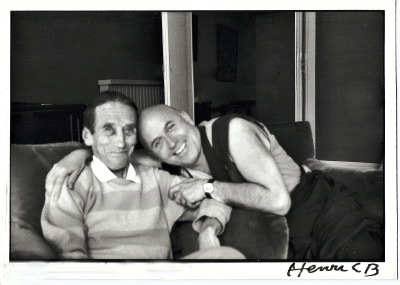M.R.: I am also convinced that every human being has within him a potential for loving-kindness, even if at times he strays from this basic goodness in monstrous ways. When people feel a deep anguish that they cannot define, it is perhaps because they have a doubt concerning this potential for love and goodness that is within us. Without this potential, life has little meaning.
P.C.: This goodness, we could also find it, strangely enough, in the Pol Pot camps, in Cambodia. There were these young female guards wearing Maoist uniforms, with black belts that they would tie around their waists, baggy pants, and a hard gaze, a cold and dark gaze. These girls, 20 or 22 years old, were pretty as could be. And yet nothing could cheer them up. Suddenly, a child came running toward me and threw himself in my arms. The girls then all started to smile tenderly. On another day, still in Cambodia, I crossed paths with elderly women who were completely toothless. Their noses had also been broken during torture sessions. They must have been between 75 and 80 years old, and their skin was all wrinkled. I told them, ‟You are beautiful!” They were so happy and told me ‟But no one is telling us this!” and they tried to carry me in triumph. As they were quite weak, they crumbled under my weight. Also in Cambodia, Buddhist monks would often invite me to their monastery and have me sit in the Abbot’s usual place. We would pray together; it was impressive. We would say a universal prayer, one of universal love.
 Father Ceyrac and Matthieu by Henri Cartier-Bresson
Father Ceyrac and Matthieu by Henri Cartier-Bresson
M.R.: Love or compassion can be limited and partial, mixed with attachment. Universal compassion embraces all living beings without discrimination. It is a state of complete openness to others, strengthened by wisdom.
Claudine Verniez-Palliez: Would universal compassion be the link among all religions, all spiritualities?
P.C.: There are colorful variants according to different traditions, but it is always about this same movement of love that consists in going toward the other. I do not like the word ‟charity,” which has a condescending element, but I do like the word ‟love.” Our conventional idea of charity puts into question our donation. True charity is the opposite of piano-bar giving where the one who pays requests the music. Giving is giving. The donation belongs to the one who receives it. The way the donation is managed is the recipient’s own responsibility. ‟I is another” said Rimbaud. It is the gift to others that frees us and allows us to be ourselves. Myself, I am who I am because of others. That’s it.
M.R.: In Buddhism, it says that an individual is not self-existent but rather exists only in relation to others and his environment. Our happiness can only exist through the happiness of others. People very often confuse pleasure with happiness. As a result, they seek in vain lasting fulfillment through fleeting pleasures.
P.C.: We are relationships, recipients of relationships and the source of relationships. The more we are ‟Persons,” the more we are relationships, and the more we are ‟Relationships,” the more we are persons.